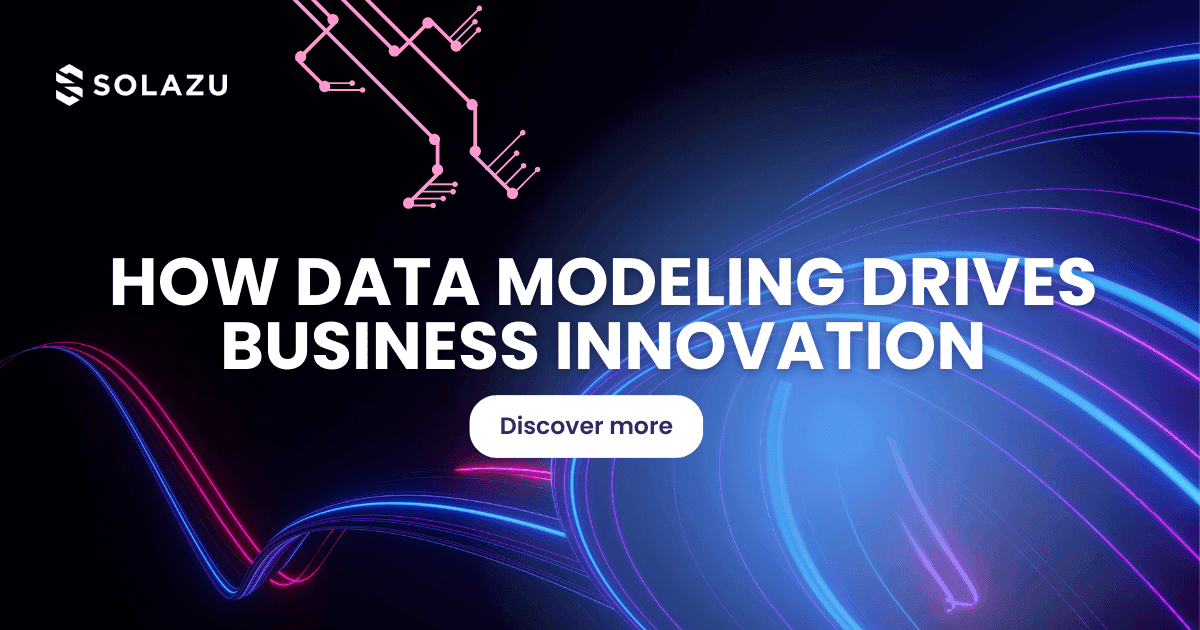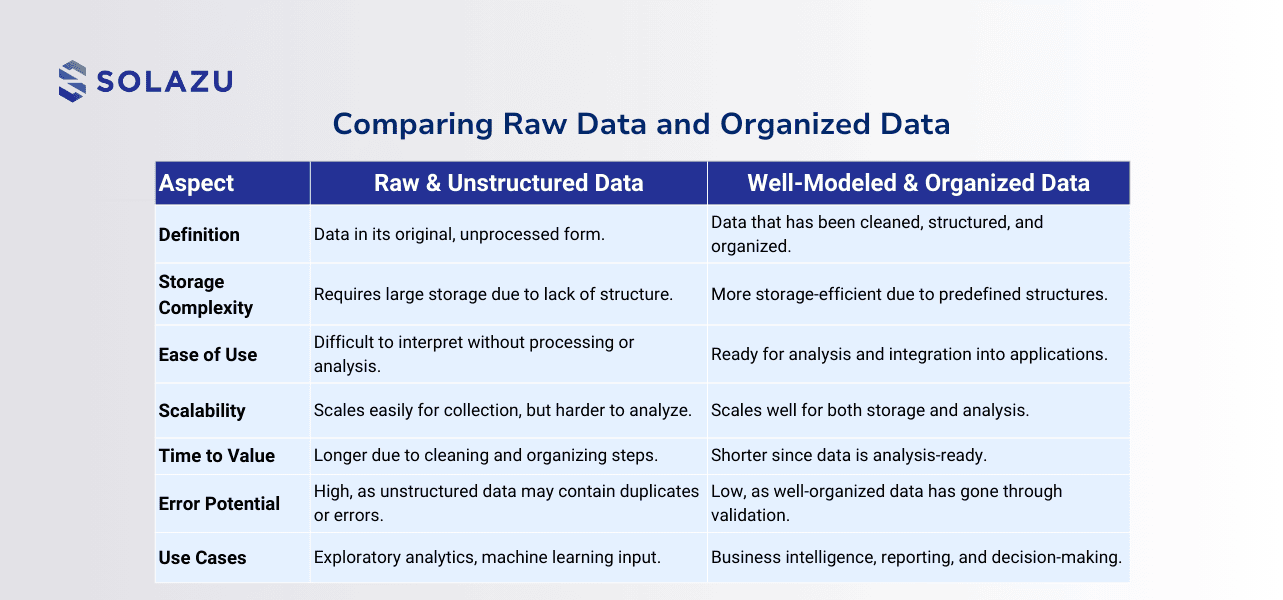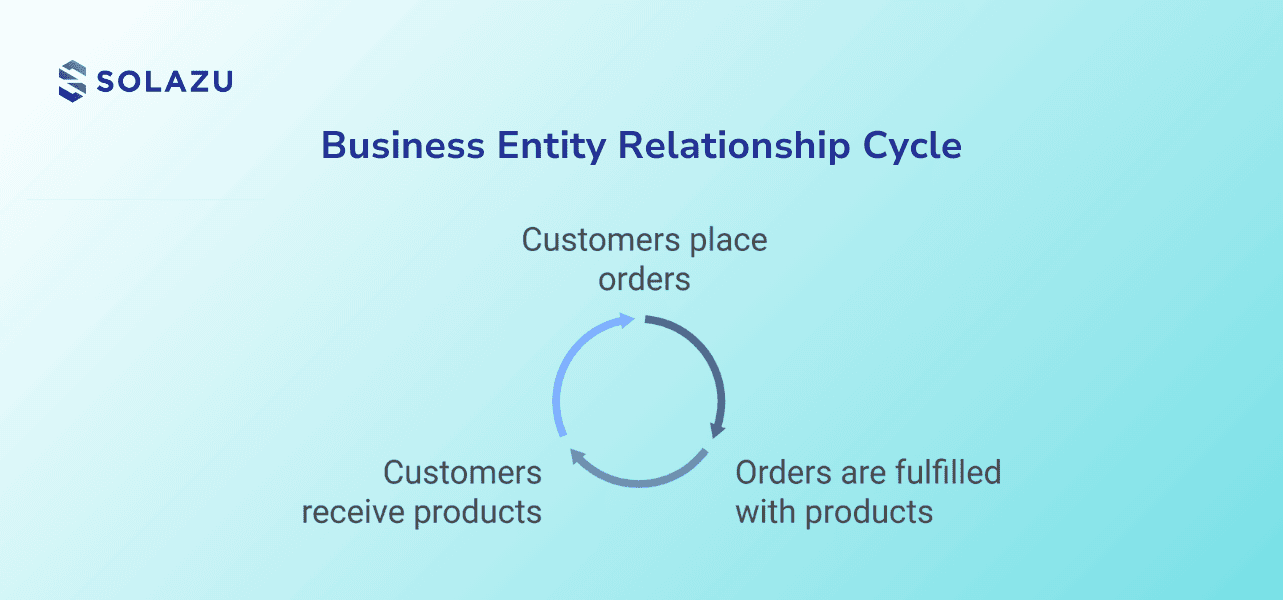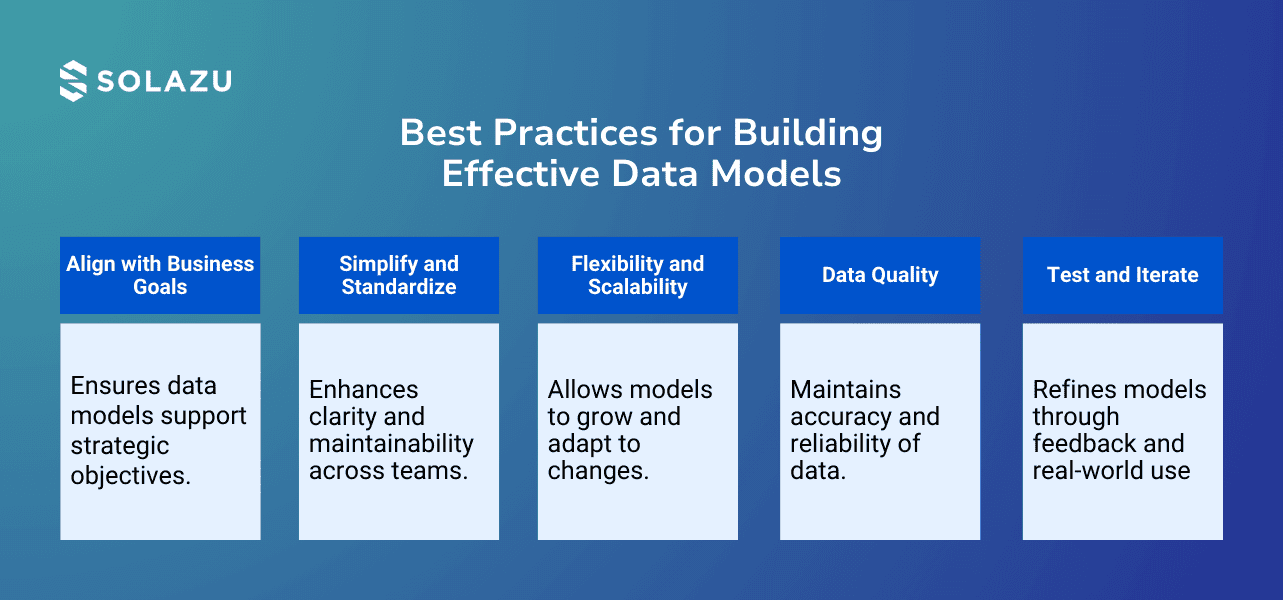How Data Modeling Drives Business Innovation

In today’s digital-first world, businesses are drowning in data yet often starve for insights due to unclear data requirements. The volume, variety, and velocity of modern data can be overwhelming, leaving many organizations struggling to make sense of it. Without the right data modeling structure in place, data remains untapped potential, limiting growth and innovation.
At Solazu, we believe that robust data modeling is the blueprint for transforming raw, unstructured data into meaningful insights. When done right, it improves decision-making, enhances operational efficiency, and fuels business innovation. Whether you’re optimizing existing processes or starting fresh, adopting data modeling best practices is essential to success.
In this blog, we’ll explore:
- The basics and benefits of data modeling.
- Different types of data models.
- Best practices for building effective models.
- Common challenges and solutions.
- Tools to streamline the process.
- Ways to Measure the Impact of Data Modeling
Let’s unlock how data modeling can empower your organization to stay competitive, agile, and future-ready.
What is Data Modeling and Why is it Important?
At its core, data modeling is the process of organizing and structuring data to ensure clarity, consistency, and accessibility. Think of it as a blueprint for your data ecosystem—helping businesses identify relationships, define rules, and establish standards for data storage and retrieval.
Without data modeling, businesses risk inefficiencies:
- Disconnected data silos.
- Inconsistent reporting.
- Poor decision-making based on incomplete or inaccurate information.

At Solazu, we help businesses design tailored data models that align with their specific goals, ensuring data becomes a strategic asset—not just a byproduct of operations.
Key Benefits of Effective Data Modeling
Data modeling isn’t just about organizing information—it’s about driving value. Here’s how it benefits businesses:
- Improved Decision-Making: Well-structured data enables quick and accurate analysis, leading to more informed decisions.
- Enhanced Data Quality: Models establish validation rules to minimize errors and inconsistencies.
- Streamlined Operations: By identifying redundancies and inefficiencies, data modeling optimizes workflows.
- Future-Proof Scalability: A strong model grows with your business needs.
- Better Collaboration: Models ensure that all teams (technical and non-technical) speak a common data language.
At Solazu, we take pride in building models that bridge the gap between business strategy and data infrastructure.
Types of Data Models
Data modeling involves creating logical data models that are categorized into three main types, each serving a unique purpose in the data management process:
1. Conceptual Data Models
- What it is: A high-level, abstract view of your data.
- Purpose: Define broad business entities and relationships without technical details.
- Who uses it: Business leaders, analysts, and non-technical stakeholders.

2. Logical Data Models
- What it is: A logical data model is a detailed representation of the relationships and attributes of data entities, playing a crucial role in data modeling.
- Purpose: Bridge the gap between conceptual vision and physical implementation.
- Who uses it: Data architects, analysts, and database designers.
Logical models focus on relationships, rules, and data structure without worrying about hardware specifics, but carefully consider data modeling and data requirements. At Solazu, we use these models to ensure consistency across systems and processes.
3. Physical Data Models
- What it is: A technical blueprint for database implementation.
- Purpose: Define how data will be stored, retrieved, and optimized.
- Who uses it: Developers, database administrators, and IT teams.
Key Components:
- Storage allocation strategies.
- Indexing for faster queries.
- Partitioning for performance optimization.
- Security protocols, including encryption and access control.
With Solazu’s expertise, physical models are optimized for performance, ensuring reliable data access when you need it most.
Best Practices for Building Effective Data Models
To maximize the impact of data modeling, follow these best practices:
1. Align with Business Goals
Start by identifying key business objectives.
Collaborate with stakeholders to define measurable outcomes (KPIs).
2. Simplify and Standardize
Avoid overcomplicating your models. Simplicity ensures models are adaptable and easier to maintain.
Use standardized naming conventions and rules to enhance clarity across teams.
3. Ensure Flexibility and Scalability
Design models that can adapt to changing business needs and future growth.
Use modular components to integrate new data sources seamlessly.
4. Focus on Data Quality
Implement validation rules to detect and fix errors early.
Continuously monitor and audit your data to maintain accuracy.
5. Test and Iterate
Validate models in real-world scenarios before deployment.
Collect feedback from users and refine models regularly to keep them relevant.

Common Challenges in Data Modeling and How Solazu Solves Them
While data modeling is a powerful tool for driving insights and business transformation, it isn’t without its challenges. From handling complex data environments to maintaining consistency and adapting to business changes, organizations often find themselves struggling to keep up. Here are the most pressing challenges and how Solazu helps you overcome them.
Challenge 1: Managing Data Volume and Complexity
In today’s digital economy, businesses generate enormous volumes of data from diverse sources—databases, CRM systems, IoT devices, social media platforms, and more. While this influx of data holds incredible potential, its sheer complexity often leads to problems:
- Disconnected Data Silos: Data stored in separate systems (e.g., marketing tools vs. sales databases) prevents a unified view.
- Inconsistent Formats: Different sources use varied formats (structured, semi-structured, or unstructured), making it challenging to integrate.
- Scalability Issues: Traditional models struggle to handle large, fast-growing datasets, causing slow performance and bottlenecks.
How Solazu Solves It:
At Solazu, we tackle data complexity with a structured, scalable approach:
- Unified Data Architecture: We design models that integrate diverse datasets into a single source of truth, ensuring seamless access to consistent information across departments.
- Modular Data Models: Our solutions use modular architectures to break down complex systems into smaller, manageable components that can scale independently.
- Automated ETL Pipelines: By automating Extract, Transform, and Load (ETL) processes, we simplify the integration of multi-format data into clean, structured models.
- Future-Ready Scalability: Our models are optimized to grow with your data, ensuring performance remains consistent as volumes increase.
Challenge 2: Ensuring Data Quality and Consistency
Data quality issues are one of the most significant barriers to effective decision-making. Poor-quality data—caused by errors, duplicates, or inconsistencies—leads to flawed insights and lost opportunities.
Common data quality challenges include:
- Duplicate Records: Customer records replicated across systems create confusion and inefficiency.
- Missing or Incomplete Data: Gaps in data can compromise the accuracy of reports and models.
- Inconsistent Standards: Lack of standardized naming conventions or validation rules leads to conflicting data formats.
How Solazu Solves It:
At Solazu, we implement rigorous practices to maintain data integrity and quality throughout the modeling process:
- Automated Data Validation: We deploy tools like Great Expectations and custom scripts to validate data at every stage, ensuring completeness and accuracy.
- Data Governance Frameworks: Our models include built-in validation rules, naming conventions, and governance processes that ensure consistency across all data sources.
- Continuous Auditing: We use real-time monitoring and auditing systems to identify and address anomalies or errors before they impact operations.
- Standardization Across Systems: Solazu harmonizes disparate datasets by creating uniform schemas and taxonomies that all teams can follow.
Challenge 3: Adapting to Changing Business Requirements
The pace of business today is faster than ever. Organizations need to pivot quickly to meet new demands, adopt emerging technologies, or address shifts in market trends. However, rigid data models can become outdated, making it difficult to adapt:
- Lack of Flexibility: Static models require significant redevelopment when business priorities change.
- New Data Sources: Introducing new data streams (e.g., from IoT or AI platforms) often disrupt existing models.
- Evolving Goals: As businesses grow, objectives shift, requiring models to align with new strategies.
How Solazu Solves It:
Flexibility is at the heart of Solazu’s approach to data modeling:
- Agile Development Methodologies: We adopt an Agile approach, enabling iterative updates to data models as requirements evolve. Each iteration introduces incremental changes, reducing downtime and enhancing adaptability.
- Modular, Scalable Designs: Our models are built using modular frameworks, allowing individual components to be updated without disrupting the entire system.
- Seamless Integration of New Data: We ensure that our models can quickly accommodate new data sources through automated ETL pipelines and flexible schema designs.
- Proactive Monitoring and Optimization: With continuous feedback loops and performance monitoring, we refine data models over time, aligning them with your evolving business needs.
Challenge 4: Balancing Performance with Cost Efficiency
Building high-performance data models can often strain budgets, especially when managing large datasets or scaling infrastructure. Businesses struggle to strike the right balance between speed, cost, and performance.
How Solazu Solves It:
Solazu optimizes performance without overextending budgets:
- Cloud-Native Solutions: We leverage cloud platforms like AWS, Azure, and Google Cloud to provide scalable, cost-efficient models that grow as needed.
- Performance Optimization: Solazu fine-tunes storage allocation, indexing, and partitioning strategies to boost efficiency while controlling costs.
- Data Archiving and Tiered Storage: By archiving older, less critical data, we help organizations reduce infrastructure costs without sacrificing accessibility.
- Cost Monitoring: We integrate cost analysis tools to track and optimize resource usage, ensuring value without unnecessary expenditure.
Tools to Streamline Data Modeling
Choosing the right tools can make data modeling more efficient. Popular options include:
- Erwin Data Modeler: Ideal for building logical and physical models.
- IBM InfoSphere: Offers robust data integration and management capabilities.
- Lucidchart: Great for collaborative, visual modeling.
- dbt (Data Build Tool): Automates transformations and documentation.
At Solazu, we help businesses select tools that integrate seamlessly with existing systems while being scalable for future growth.
Measuring the Impact of Data Modeling
How do you know your data modeling efforts are successful?
Key Metrics:
- Decision-Making Speed: Has the time-to-insight improved?
- Operational Efficiency: Are workflows more streamlined?
- Data Accuracy: Is data clean, consistent, and reliable?
Using KPI dashboards and real-time analytics platforms, Solazu helps organizations measure and showcase the tangible impact of their data modeling efforts.
Conclusion
Data modeling, with clearly defined data requirements, is the foundation of a strong data strategy. When done right, it enables businesses to transform raw data into actionable insights that drive growth, innovation, and operational excellence. At Solazu, we don’t just build data models—we specialize in data modeling to create solutions that align with your unique goals. Whether you’re starting from scratch or optimizing existing systems, we’re here to guide you every step of the way.
Ready to elevate your data strategy? Contact Solazu today and let’s unlock the full potential of your data.
次のステップへよりスマートなソリューションへ
貴社の業務効率化、コスト削減、持続的な成長を実現する戦略をご提案します。今すぐ無料相談を予約し、Solazuの専門家と最適なソリューションを見つけましょう!
